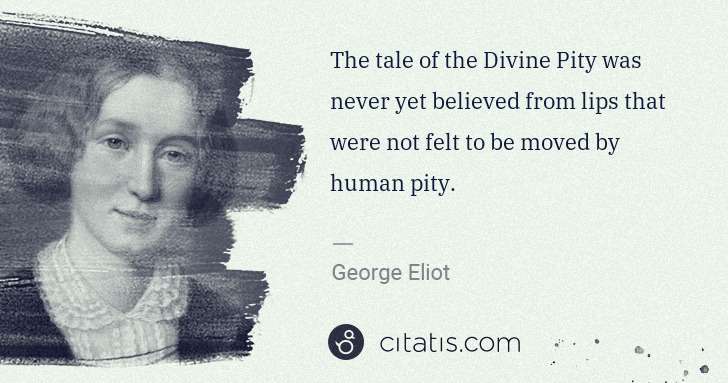
George Eliot Quotes

The tale of the Divine Pity was never yet believed from lips that were not felt to be moved by human pity.
 George Eliot
George Eliot
Quotes to Explore
-
No, we believed in ourselves all year. That's the position you want to be in.
 Eli Manning
Eli Manning
-
A sense of humor is rare. It isn't telling a joke about how there are three ways to get to heaven. It's being in a restaurant and hearing someone say, Everyone's got their tale of woe, and then turning around and saying, Unfortunately, in life, there's more woe than tail.
 Jack Roy
Jack Roy
-
It is believed by experienced doctors that the heat which oozes out of the hand, on being applied to the sick, is highly salutary. It has often appeared, while I have been soothing my patients, as if there was a singular property in my hands to pull and draw away from the affected parts aches and diverse impurities, by laying my hand upon the place, and extending my fingers toward it. Thus it is known to some of the learned that health may be implanted in the sick by certain gestures, and by contact, as some diseases may be communicated from one to another.
 Hippocrates
Hippocrates
-
If to some my tale seems foolishness I am content that such could count me fool.
 Sophocles
Sophocles
-
Do you believe in immortality? No, and one life is enough for me.
 Albert Einstein
Albert Einstein
-
The significance of language for the evolution of culture lies in this, that mankind set up in language a separate world beside the other world, a place it took to be so firmly set that, standing upon it, it could lift the rest of the world off its hinges and make itself master of it. To the extent that man has for long ages believed in the concepts and names of things as in aeternae veritates he has appropriated to himself that pride by which he raised himself above the animal: he really thought that in language he possessed knowledge of the world.
 Friedrich Nietzsche
Friedrich Nietzsche
-
After my conviction, I was devastated. I had never believed that I would be convicted.
 Amanda Knox
Amanda Knox
-
There was a leap of joy in him, like a flame lighting up in a dark lantern. At this moment he believed it was worth it. This moment of supreme beauty was worth all the wretchedness of the journey. It was always worth it. "For our light affliction, which is but for a moment, worketh for us a far more exceeding and eternal weight of glory." It was the central truth of existence, and all men knew it, though they might not know that they knew it. Each man followed his own star through so much pain because he knew it, and at journey's end all the innumerable lights would glow into one.
 Elizabeth Goudge
Elizabeth Goudge
-
You don't need great actors to do a 3D picture. All of this condescending stuff that they put out? "Oh, we will always need actors." Bullshit! They are able to take anybody and put some markers on them, and have them walk through an empty room. Then they paint in the background.
 William Friedkin
William Friedkin
-
If you're long-term oriented, customer interests and shareholder interests are aligned.
 Jeff Bezos
Jeff Bezos
-
The tale of the Divine Pity was never yet believed from lips that were not felt to be moved by human pity.
 George Eliot
George Eliot














































